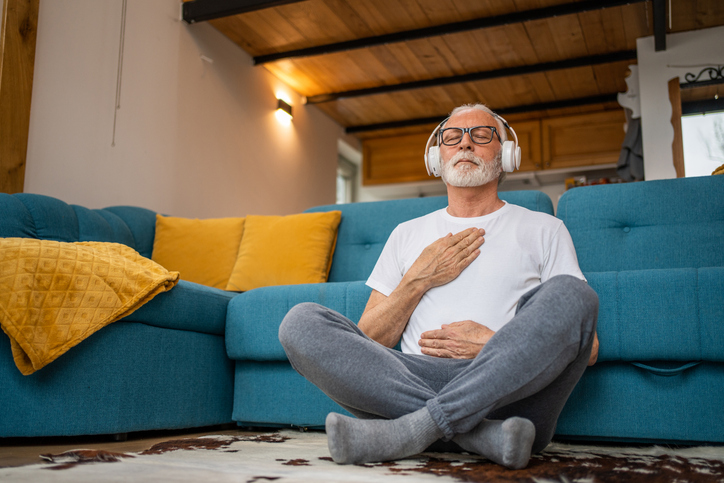Relaxation Techniques for Mental Wellness
“Just relax.” While it sounds simple, it is often quite difficult to calm our minds and relax the tension in our bodies. However, the ability to relax and de-stress is important for maintaining mental health and can be very helpful for lessening symptoms of many mental and physical health conditions. For example, relaxation can improve focus and mood, improve sleep quality, lower blood pressure and improve digestion.
There are numerous techniques for relaxation, many with robust evidence for their effectiveness. Here, we’ll highlight a few approaches and provide resources for more information to help you get started.

Breathing exercises. Several relaxation techniques incorporate breathing, specifically deep breathing. Deep breathing, also called belly breathing or diaphragmatic breathing, involves slow, deep breaths that fully fill the lungs and cause the lower belly to rise. See a sample breathing exercise for stress. There are many different breathing techniques, such as 4-7-8 breathing, belly breathing and box breathing. Learn more and try some simple breathing techniques.
Breathing exercises can be especially helpful in overcoming difficulties sleeping. The Sleep Foundation offers step-by-step guidance on a variety of breathing exercises with a particular focus on calming the mind and body and helping you fall asleep: Relaxation Exercises To Help Fall Asleep.
Progressive relaxation (or progressive muscle relaxation). This involves tensing different muscles in your body and then releasing the tension. For example, you might tense and relax the muscles in your toes and then gradually work your way up to your neck and head. Progressive relaxation can help you focus on the difference between muscle tension and relaxation and become more aware of tension. Learn more and practice with a guided audio.
Guided imagery or “visualization.” In guided imagery, you use mental picture objects or scenes that are peaceful and calming. Other senses are incorporated through imagining peaceful sounds, for example, or the sensation of a soft breeze or warm sun. View a guided imagery video.
Biofeedback-assisted relaxation. Biofeedback is a mind-body therapy, delivered by a certified healthcare professional, that uses feedback from monitoring of body functions such as heart rate, breathing, and muscle tension. During the sessions, you learn strategies to change your body responses, including relaxation.
Autogenic training. Autogenic training is a relaxation technique that uses mental exercises to help you relax. (Autogenic means ‘coming from within.’) During autogenic training, participants close their eyes and slowly repeat specific phrases focused on creating calming sensations across different areas of the body. A session typically lasts 15 to 20 minutes and it can be done one-on-one or in a group. Learn more about autogenic training.
Finding Relaxation that Works for You
Relaxation strategies come in many forms, ranging from simple things you can do yourself to more structured programs, and different strategies will work better for some than others. Below are a few suggestions to consider. (Adapted from Relaxation, University of Michigan)
| “Soothing” Activities | “Mind-based” Relaxation Strategies | “Body-based” Relaxation Strategies |
|---|---|---|
| Sounds: enjoyable music; ambient music; nature sounds (ocean waves; birds) |
Meditation/mindfulness meditation | Breathing: slow-paced diaphragmatic |
| Smells/aromatherapy: candles; diffuser/essential oils |
Body scan/body awareness | Yoga |
| Sights/visualization: beaches, falling leaves; pleasing artwork |
Prayer | Progressive muscle relaxation |
| Tai Chi |
Keep in mind it may take some time and effort to identify what works for you and the relaxation techniques take time and practice to become familiar and experience the benefits. The time and effort can pay off in improved physical and mental well-being and quality of life. If you are having trouble on your own, reach out to a mental health professional for help.
Learn More
- Relaxation Skills, University of Michigan
- Yoga for Health - National Center for Complementary and Integrative Health
- Guided Imagery session – Johns Hopkins University
- How to do progressive muscle relaxation for anxiety. Anxiety Canada
- MIND Mental health apps - help with finding apps for mental health
- Tai Chi, Massage therapy – National Center for Complementary and Integrative Health
References
- National Center for Complementary and Integrative Health/NIH – What are the different types of relaxation techniques?
- US. Department of Veterans Affairs. 2018. Whole Health: Information for Veterans. Autogenic Training.
- Positive Psychology.org. How to Relax: Best Relaxation Techniques for Anxiety (positivepsychology.com).
- Hayes-Skelton SA, et al. 2013. A contemporary view of applied relaxation for generalized anxiety disorder. Cogn Behav Ther. 2013;42(4):292-302. doi: 10.1080/16506073.2013.777106.
- Mayo Clinic. Relaxation techniques: Try these steps to lower stress.
- Harvard Health. Relaxation techniques: Breath control helps quell errant stress response, July 6, 2020.
